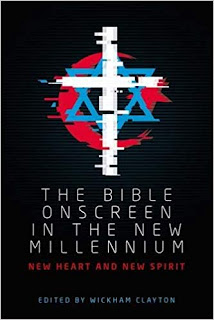Friday Night, Saturday Morning:
Monty Python vs The Church
 Having been waiting to see this for years now, it was very pleasing to discover that the show had been re-broadcast by BBC4 to coincide with the broadcast of Holy Flying Circus last Wednesday. It's available on iPlayer for two more days.
Having been waiting to see this for years now, it was very pleasing to discover that the show had been re-broadcast by BBC4 to coincide with the broadcast of Holy Flying Circus last Wednesday. It's available on iPlayer for two more days.For those unfamiliar with the details, in the run up to the release of Life of Brian the BBC's late night talk show in hosted the now infamous debate between John Cleese, Michael Palin, Malcolm Muggeridge and Mervyn Stockwood, the then Bishop of Southwark. It must have made a big impact then as well: shortly afterwards the TV comedy sketch show "Not the Nine O'Clock News" produced a well-executed spoof.
Having seen numerous clips of this debate over the years, almost whenever the film is discussed in fact, I have long wanted to see the whole thing, and have wondered why the full version hadn't appeared on any of the many special edition DVDs of Life of Brian.
The most likely reason for this it now appears is length. Given that most comparable programmes today usually restrict such items to 15 minutes; that I always seem to see the same few excerpts; and from what I'd gleaned from various discussions of the programme, I'd always assumed it was about 10-15 minutes. In fact the programme spends over 52 minutes on the subject, briefly squeezing in a song from Paul Jones and a chat with Norris McWhirter before it ended 15 minutes later.
Something else also became fairly clear: the reason that these same few excerpts are repeated again and again (despite the quantity of material) is that the debate was incredibly poor. Leaving aside the fact that Stockwood and Muggeridge, and to a much lesser extent Cleese and Palin, fail to listen to what their opponents are saying, chairman Tim Rice, just lets the church representatives drone on and on about irrelevant side issues. No wonder modern day programmes tend to keep things shorter.
Part of this is perhaps because they missed the crucial opening scenes of the film which established that Brian was not Jesus, but it was mainly due to the pair being allowed to bring notes, and Rice's deferential attitude to them. The 1970s were a very different time, with the authority of the church having a far greater hold - for instance the first ever "Question Time" featured a bishop, but I can only remember that happening once when I've watched it and I'm an avid fan. Stockwood in particular seemed to think the he was entitled to go on and on rather tangentially, and Rice seems too intimidated to step in.
I suppose this was also due in part to the fact that Palin and Cleese were interviewed on their own first, and so, to a certain extent, had already had their say. Yet the subjects being discussed were far less controversial in this section. They talked about the process of raising the finance, and how they develop the script and so on. There were even a couple of interesting points around Bible films. Incredibly for a man who only a few years before had contributed to a hit film about Jesus, Rice had never heard of Rossellini, or Il Messia, which was released just two years after Jesus Christ, Superstar. Secondly Cleese makes the point that three more biblical comedy films were in production, which makes me wonder which one. Wholly Moses (1980) would seem obvious, but it tries so hard to cash in on Life of Brian that it's hard to imagine that it was close to completion much before Brian's welease. Mel Brooks' History of the World: Part 1 (1981) would be the other likely choice, but as to a third, all I can think of is the French film Deux heures moins le quart avant Jésus-Christ, released in 1982.
That said, it was this section of the show that contained what was, for me, one of the most interesting parts of the show.
RiceCleese elaborates on this later on including talking about how if Christianity is true then death does have a bright side. I must admit that I've never really thought about that final scene in that way. I'm not sure the latter point holds up that well, but I'm certainly intrigued by the part of his answer quoted above.
"Is there anything that could offend you on screen"
Cleese (shrugs, then pauses)
"I have one tiny quibble and I think that Terry Jones and Graham Chapman would no doubt disagree with me, but I think the crucifixion thing at the end is not about pain, it's about death and they are very separate."
Rice
"So what's your beef?" [i.e. what's your problem?]
Cleese
My beef is that there are one or two close-ups of one or two people registering pain and I think that that confuses what the last thing's about. 'Cos I mean one's not really making fun of the fact that someone has been flayed to this flesh hung down and then nailed up. The point of that last thing is that it's about death, y'know it's about attitudes to death, and it's quite possible, to be relatively cheery about death, quite possible. I'm not saying it's easy.
The above exchange is typical, actually, of Cleese's attitude throughout the debate. It's often been said that he and Palin were trying to have a serious debate and the two non-comedians were playing for, and getting, the laughs. Indeed one point that really stood out to me is when Cleese is trying to make a serious point but because his answer sounds like something out of a Python sketch the audience laugh, and Cleese looks almost aggrieved that his serious point has been lost because it was mistaken for a joke. Cleese steals the show actually. Stockwood and Muggeridge are two smug and too entrenched to really get their point across, indeed it could be argued that this debate was the defining moment of the established church's weakening grip on authority. Palin for his part is clearly furious and insulted and whilst his restraint is impressive, it hampers his contribution to the discussion.
One final thing that I found interesting was how little these debates have changed in some ways. Whenever some perceived "outrage" is perpetuated against Christianity, someone will always object that "they" would dare to do this kind of thing about Islam. This argument is put to Cleese and he demolishes fairly well, by explaining about the dominance, authority, history and impact on the culture that Christianity has had and how this is why they set their sights on it. So it's surprising that 30+ years later the argument is still trotted out overlooking the fact that people do satirise Islam, and that Jesus is also considered a prophet in Islam.
Secondly Stockwood/Muggeridge also lament the declining standards in biblical understanding. Perhaps this is even worse now than it was, but it was interesting to note that this was a point of debate even then. Other things are different though. The opening credits are far racier than any you see today - a couple seemingly naked and in bed stop to turn on the show. It wasn't clear if this was during, after or instead of having sex, but whichever way there would probably be a fair amount of complaint about increasing sexualisation of our culture were this to happen today.
Overall then, the debate was a bit of a disappointment. The best bits have obviously been shown many times before and what is usually left out was fairly dreary. If only Rice had been David Dimbleby. At least Dimble might have heard of Rossellini.
Labels: Life of Brian













1 Comments:
At 6:09 pm, October 30, 2011, Aguilar Elliot said…
Aguilar Elliot said…
hmm...interesting discussion. life of brian tackles touchy subject matter but i didn't sense that it was blasphemous.
Post a Comment
<< Home